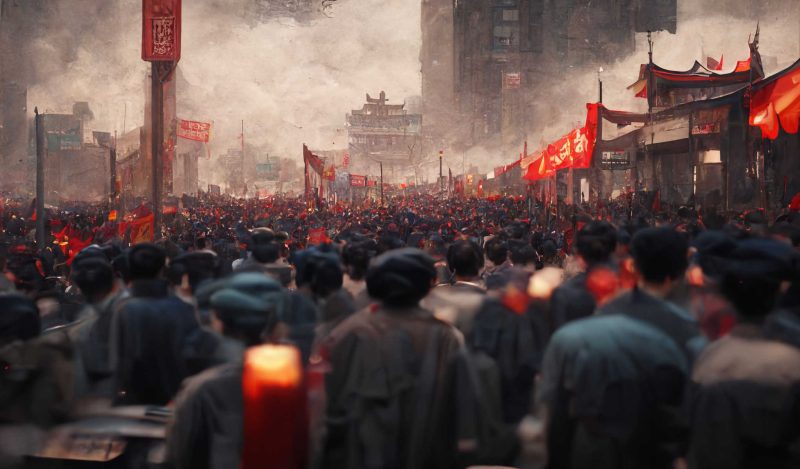When Cato Institute co-founder Ed Crane visited the Soviet Union in 1981, he was already a critic of arms-race brinksmanship with the US’s foremost enemy. Instinct told him a country lacking freedom would pose no threat to the freest country on earth.
Upon seeing the USSR up close, what Crane instinctually knew was vivified by sight. Miserable people walking in hunched-over fashion in cities that literally smelled of communism. Worse for the would-be power, there was no economy. In an essay written upon return, Crane was clear that the US had no reason to fear the surely evil USSR. Since collectivism was the economic policy, the Soviet Union lacked the economy to ever pose a military threat to the richest nation on earth.
This is something to keep in mind amid the seemingly interminable lockdowns in China meant to achieve what is both impossible and pointless: “Zero COVID.” This is the policy of the allegedly formidable Chinese leader Xi Jinping. Yet we fear China? “Zero COVID” and China as a true power in no way tessellate.
That is so because whatever one’s opinion of the coronavirus (be it lethal, a non-story, or somewhere in between), the last thing a serious country would ever do is suffocate freedom in response. Assuming the virus is the major death and health threat that Xi and others seemingly think it is, the only reasonable response to such a view would be for those in power to do nothing.
As China’s rise from desperate poverty over the decades indicates, free (or freer) people produce the wealth that’s frequently matched with doctors and scientists working feverishly to turn today’s killers into yesterday’s afterthoughts. Economic growth is hands down the greatest foe that death, disease and sickness have ever known. Nothing else comes close. If something might threaten to kill us or hospitalize us, prosperity is the only response.
Please think about this with Xi’s authoritarian response to the coronavirus top of mind. The General Secretary of the Chinese Communist Party (CCP) is quite literally choosing economic contraction as a virus mitigation strategy. Rest assured that historians, including Chinese historians, will marvel at the abject foolishness of Xi’s response. Let’s cheer lustily for the courageous Chinese people presently protesting what vandalizes reason.
Just the same, historians will similarly marvel at the extraordinary paranoia about China revealed by the policy elites on the Left and Right in the United States. Their view is that China’s powerful state with Xi at the top explains why we must be afraid. Supposedly a leader without checks and balances can bully and command an unfree nation to greatness.
To provide one example from the Right, in an opinion piece written for the Wall Street Journal last week the Hudson Institute’s William P. Barr (Attorney General in the Trump administration) wrote with evident worry that in 2015 “the Chinese Communist Party launched Made In China 2025 – an aggressive and highly orchestrated campaign to supplant the U.S. as the world’s pre-eminent economic power.” And then not to be upstaged by the China-fearful on the Right, the Biden administration just this week banned the sale or import of telecom equipment by Chinese giants including Huawei and ZTE since they allegedly pose “an unacceptable risk” to US national security. These views don’t stand up to basic scrutiny.
Indeed, time was that members of the Right in particular would look at command-and-control with haughty disdain given the consistent failure of governments the world over when it’s come to centrally planning positive economic outcomes. Politicians always and everywhere constrained by the known can’t possibly “orchestrate” prosperity when it’s remembered that the latter is always and everywhere a consequence of intrepid entrepreneurial leaps made by creative minds into a commercial future that by its very description is unknown.
Which is why the Biden administration’s actions are so indefensible. Assuming what Barr believes to be true about “Made In China 2025,” there would be no reason to ban the wares of Huawei, ZTE, or any other Chinese company simply because corporations said to be commanded by politicians would never pose much of a competitive threat in a free country like the US to begin with. Indeed, how soon we forget that central planning was a wretched failure in the 20thcentury. Will it not fail in the 21st? The question should answer itself.
As should the question about whether a locked down country poses a warring threat. It shouldn’t. Governments have no resources other than what they can extract from the private sector, and at present Xi is to varying degrees suffocating the private sector in a vain attempt to banish a virus.
So while the view here is that China’s post-Mao prosperity was a rather peaceful gesture (imports always and everywhere improve the health and wealth of those importing) by the Chinese to the rest of the world, a growing lack of freedom in Asia’s foremost country is the surest signal we need that China’s lust for greatness is more rhetorical and performative than real. In other words, the only way to be beaten by China is to mimic its authoritarian ways. Please keep this in mind with what indefensibly happened stateside in 2020.
Republished from RealClearMarkets
Join the conversation:


Published under a Creative Commons Attribution 4.0 International License
For reprints, please set the canonical link back to the original Brownstone Institute Article and Author.









